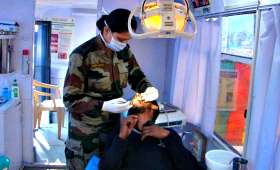Recommended candidates appear before the medical board for carrying out their medical board after the SSB results. It takes 4 to 5 days time for the concerned Military Hospital to complete the medical board and after that the candidates are dispersed. NDA candidates are examined both for Army and Navy unless otherwise instructed and endorsement of fitness status will be made accordingly. President of the medical board will guide the candidates for Appeal/Review Medical Board procedures. Candidates may seek the advice of President Special Medical Board for review/appeal in case they have been declared unfit.
Medical Examination Procedure and Tips in Service Selection Board
A medical examination Procedure is held at nearby Military Hospital and continues to 5 days.
Day 1
Candidates should not eat anything during day 1 testing. At Day 1 of Medical Examination, candidates undergo
- Urine test – looks for mineral contents in Urine
Tips to get a healthy urine test:
- Drink lots of fluids before the test. Also called flushing, this method remains one of the easiest, cheapest, and most successful ways to get ahealthy urine test.
- If you notice your urine becoming excessively watery before test, a clear tip off — try taking vitamins B-2 or B-12.
- If you are an addict then before test try taking aspirin a couple hours ago.
- Try Cranberry Juice if not organic then boxed will do, Tart cranberry juice may help keep your bladder safe from infection.
- If you have urinary incontinence, you may need to drink fewer fluids at certain times. If you’re getting up too much at night to empty your bladder, avoid fluids for two hours before bedtime.
- Some people find that certain foods worsen their bladder symptoms, Badlani says. Acidic foods, such as tomatoes and orange juice, may be linked to flare-ups. Keep a diary of your symptoms and see if you can connect them to any foods.
- Avoid Tobacco. Every year, more than 50,000 people are diagnosed with bladder cancer. Using tobacco is a major risk factor.
- Drink Plenty of Fluids — But Not Too Much
- Blood test – looks for haemoglobin and other essential minerals ratio
Tips to get a healthy blood test:
- Avoid prescription drugs, alcohol intake just before the test
- Fasting is good before blood test, few hours of empty stomach will he;p you but drink fluid as much as you can and avoid too much iron rich nutrients a day before the test it may affect the result.
- The best way to build oxygen-rich blood is to exercise. Not only does exercise help your heart pump blood, it brings fresh oxygen.
- Eat more legumes. Rich in fiber and nutrients, beans and legumes help eliminate harmful cholesterol (LDL) and lower triglycerides.
- Take a B-vitamin supplement. The B-vitamins B-6, B-12, and folate are essential to lower the amount of homocysteine in your blood.
- Eat your greens. Chlorophyll is the plant nutrient that gives vegetables their green color. It is very similar to the hemoglobin molecule. Boosting your intake of greens combined with adequate iron helps boost your blood.
- Drink aloe vera juice. Aloe vera juice has been used for many years by herbalists as a natural blood booster. It cleanses arteries and is anti-inflammatory. It is also rich in amino acids, enzymes, chlorophyll, vitamins, and minerals—all of which help build strong blood.
- Eat a more alkaline diet. The blood’s pH is naturally 7.365 but our acid-forming diets can cause the balance to shift slightly in favor of acidity, which scours the arterial walls. Reducing sugar, soda, meat, and processed foods in favor of alkaline vegetables (almost all vegetables are alkaline); alkaline fruits like avocados, fresh coconut, lemons, limes, and grapefruit; alkaline legumes like lentils, navy beans and soy; alkaline nuts and seeds like almonds, pumpkin seeds, sprouts, and sesame seeds; and alkaline grains like buckwheat, quinoa, and spelt.
- Chest X-ray – looks for any irregular or unwanted part
Tips to get a healthy Chest:
- Exercise containing Push ups, Pull ups, Compound movement, etc,work the chest at various angles to avoid any deformity of body parts.
- Breathing exercise for clearing chest and avoid sleep disorders mostly the manner in which you sleep it can affect the chest bone and muscle formation.
- Ultra-Sound Test – looks for better insight of inner organs and problems like Kidney Stones.
Tips to get a healthy Kidney & Liver Ultrasound Test:
There are only precautions that you can take,
- Emphasize high-quality proteins, in limited quantities. Protein is necessary for maintaining organ function and repairing damaged tissue. If you have compromised kidney or liver function, you should be aware that eating too much protein places a strain on these organs. Higher quality protein foods include meat, poultry, fish and eggs. Lower quality proteins are those found in vegetables and whole grains but both kinds of protein are important to maintain healthy kidney and liver function.
- Stay within your caloric range, which should be provided by your health care provider or dietitian. Anyone who has compromised kidney function should strive to maintain a health weight.
- Limit your intake of sodium. Sodium or salt is an essential mineral that is also widely used to preserve foods. Consuming too much sodium can cause an imbalance of water in your body, placing a strain on the kidneys. In addition, salt causes water retention, especially in individuals with kidneys and a liver that aren’t functioning properly.
- Avoid drinking alcohol which can cause significant liver and kidney impairment and damage. Alcohol destroys liver cells and can disrupt the delicate electrolyte balance the body maintains to maintain biological stability.
Day 2
At Day 2 of medical examination, candidates undergo
Eyes Check-up
here the related doctor looks for any defect that restrict your vision and a test is conducted for checking Night Blindness too.
Tips to get a healthy eyes check up:
- Eat healthy foods. Maintain a healthy balanced diet, including foods rich in antioxidants. Also include Omega-3, found in oily fish, also. Generally speaking, if a food is good for heart health it is good for your eyes also.
- Wear sunglasses outside. Ultraviolet (UV) light is a risk factor for cataract and AMD. Exposure when young does the most harm, so don’t forget the sunglasses as well as the hat and sunblock for your children.
- Research your family history. Many eye conditions run in families, from short- and long-sightedness and astigmatism, to more serious conditions like glaucoma and AMD.
- Avoid dry eyes. Air conditioning, heating, wind, computer use and study can each lead to symptoms of dry eye. As we get older our eyes’ ability to produce tears becomes reduced. At the age of forty we are producing half the amount of tears we produced when we were ten. Lubricating eye drops, along with nutritonal supplements and sometimes lid treatments to reduce inflammation can be used to treat dry eye.
- Nutrional supplements. Consider nutritional supplements when there is a family history of AMD, including lutein, zeaxanthin, zinc and Vitamins C and E. Recent studies (AREDS2) have indicated a benefit in doing this. Flaxseed and linolenic oils can also assist dry eye sufferers.
Day 3
At Day 3 of medical examination, candidates undergo
ENT test
ENT stands for ‘Ear-Nose-Throat’, a candidate undergo hearing test and individual checkup. Candidates with DNS surgery are acceptable in Indian military.
Tips for healthy Ear-Nose-Throat:
- Manage stress levels. Stress and anxiety have been linked to both temporary and permanent tinnitus (a phantom ringing in the ears). High levels of stress cause your body to go into fight or flight mode, which is an instinctual reaction that fills your body with adrenaline to help you either fight or flee from danger. This process puts a lot of pressure on your nerves, blood flow, body heat, and more. It’s commonly thought that this pressure and stress can travel up into your inner ear and contribute to tinnitus symptoms.
- Get regular checkups, Ask your primary care physician to incorporate hearing screenings into your regular checkups. Because hearing loss develops gradually, it’s also recommended that you have annual hearing consultations with a hearing healthcare professional. That way, you’ll be more likely to recognize signs of hearing loss and take action as soon as you do.
- The mucous membrane protects us from external threats with its mucous, which blends with impurities. Then, the small nose hairs on the mucous membrane direct these impurities toward the throat and then the stomach. Stomach acids permanently eliminate these impurities. Sneezing is also a way of getting rid of impurities. Proper nose hygiene helps the mucous membrane protect the body.
- Proper nasal hygiene starts with healthy living habits by reducing external threats in your environment. Here are a few small tips on how to reduce external threats in your environment: Avoid carpets; Don’t let dust accumulate on objects; Clean your home regularly; Humidify the air in your home; Avoid smoking and second-hand smoke.
- Your nose constantly comes into contact with allergens (mites, pollen and mould). Some people develop allergic reactions accompanied by nasal congestion and sneezing. Using saline water to clean your nose will help reduce your symptoms and eliminate allergens found in mucous.
- how to maintain healthy nasal hygiene:
- Maintain proper humidity levels in your home;
- Avoid letting dust accumulate in your home;
- Avoid cigarette smoke;
- Maintain a daily nasal cleansing routine especially for young children;
- Clean the nose more frequently when you have a respiratory infection or allergies;
- Don’t ever drink from the same glass, cup, or bottle that someone else is using, as you may be at risk of cross-contamination. The same is true for sharing eating utensils and even napkins.
- One source of infection that is overlooked by most people is the toothbrush. Left overnight, it can be a potential source of problem for the throat and mouth. Every morning, before brushing the teeth, soak your toothbrush in a glass of hot salt water (a teaspoon will suffice). This will help to disinfect the toothbrush and also helps keep it clean.
- Gargle every night with a mixture of warm water and salt. Just a pinch of salt will do. During cold and flu season, this is a habit that will help to disinfect the mouth and throat.
- One of the very best ways to protect the throat is with ginger juice and honey
- Daily vocal warm ups are a must like, Slow, gentle humming on comfortable tones are excellent warm-ups.
Day 4
At Day 4 of medical examination, candidates undergo
Surgical /medical examination
In this examination, experts check
- Height and Weight
- Blood Pressure
- Hyper-tension
- Reproductive Organs
- Anus
Day 5
At Day 5 of medical examination, candidates undergo
Dental Checkup
Here a expert doctor looks for Jumbled tooth and other features of a healthy mouth.
Tips for Healthy Teeth:
- What you put in your mouth can affect the health of your teeth and gums. Choosing the right foods early in life can be especially beneficial throughout your whole life.
- You don’t have to be a genius to know that smoking is bad for your general health but did you know that smoking reduces the blood flow to your mouth, resulting in greater chances of developing periodontal disease and oral cancers.
- Chewing gum can actually improve your alertness by 10% by improving blood flow to the brain according to a recent study in Japan. So besides neutralizing acids and cleaning your teeth, chewing gum improves motor skills.
- You should never use a hard toothbrush. Hard toothbrushes cause abrasion to your enamel, which then exposes your dentine making your teeth appear more yellowish. Rinse your toothbrush with hot water before using it to soften the bristles.
- When drinking soft drink or soda; use a straw. Using a straw will bypass the acid to your teeth.
Procedure of Appeal Medical Board
The Appeal Medical Board will be held at one of the following hospitals :-
- Base Hospital, Delhi Cantt.
- Command Hospital, Southern Command, Pune.
- Command Hospital, Eastern Command, Kolkata.
- Command Hospital, Central Command, Lucknow.
- Command Hospital, Western Command, Chandimandir.
- Command Hospital, Air Force, Bangalore.
- Command Hospital, Northern Command, C/o 56 APO.
- INHS, Ashvini, Mumbai.
The candidates will report for medical examination within the stipulated period i.e., 42 days from the date last examined by the Special Medical Board for re-examination along with the receipted copy of the MRO/TR as directed by the President Medical Board. The endeavour will be to complete the Medical Board in one day.
SSB Screening Test Online Prepration
Review Medical Board
In case of candidate being declared unfit by the Appeal Medical Board, he/she may challenge the proceedings and may be granted review of medical proceedings based on the merit of the case. Any candidate desiring for a review should address the request to Recruiting Directorate (Personnel & Coord), Army Headquarters, West Block III, RK Puram, New Delhi with a copy to the President of Appeal Medical Board within one day of the holding of Appeal Medical Board. The application for RMB are routed through DG AFMS. The decision for grant of RMB is with DG AFMS, and is not a matter of right. RMBs are conducted at R&R Hospital Delhi Cantt and AFMC, Pune.
Stay During the Medical Examination
The recommended candidates after the declaration of SSB results will stay in the Selection Centres in the lines earmarked for the recommended candidates for their medical examination by the Military Hospital. The candidates will be allotted fresh medical chest numbers for the purpose.
Candidates who go for Appeal Medical Board or have to get their medical examination done at a later date due to some unavoidable reasons will do so under their own arrangements.
Discipline during Medical Examination
It is utmost important that recommended candidates maintain proper discipline during their stay in Selection Centres during their conduct of medical examination. The candidates are required to put on their medical Chest Number (with Red Cross) whenever they are present in the campus of Selection Centres.























10 thoughts on “Medical Examination Procedure and Tips in Service Selection Board”
Sir/mam,
Can Appendicitis surgery would be reason of TR/PR..
Clips are allowed or not to teeth in cds ssb medical examination ?
Sir I have an minor flat foot means I am in early stage so is am I unfit for Indian army or there is a chance of getting through the medical examination please suggest.
Hi sir I recently underwent a SLAP Tear surgery in my right shoulder due to dislocation. And the doctor told nothing major your shoulder will be back to normal and can do all the activities. So will I be rejected because of this in ssb medical for Indian army.
Sir,A muscles build by eating supplement and doing work out is exceptable in army or not excepted
My left hand was fractured when i was 6 yeras old. Will lead to rejection?
I think I have minute knock knees. So, will you please suggest me some exercises to cure it.
Sir I have 2 RCTs in my teeth in pre molar will I phase trouble
pus comes from my ear .. can be i selected…?
I have nasal allergy.will i be selected?